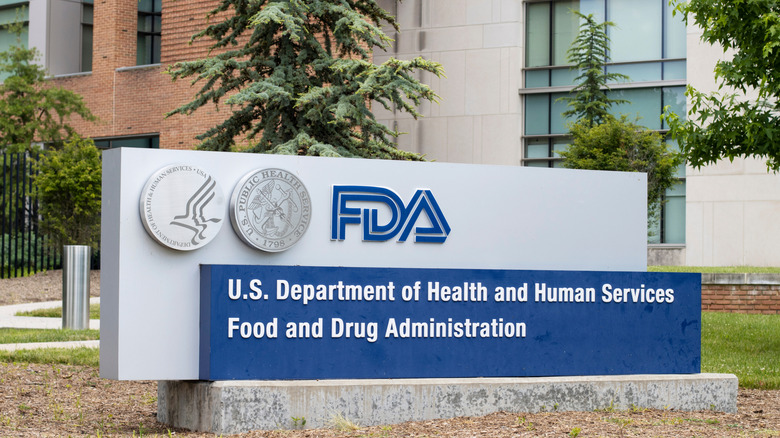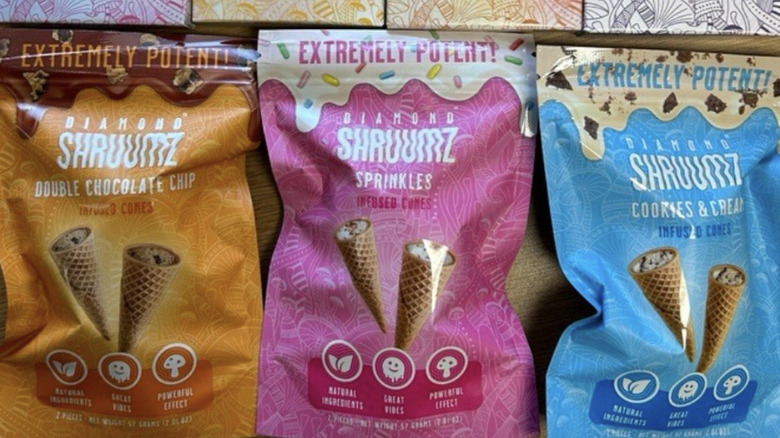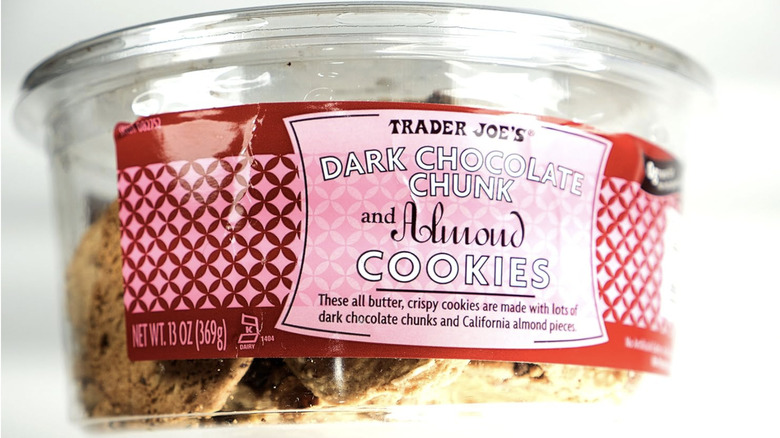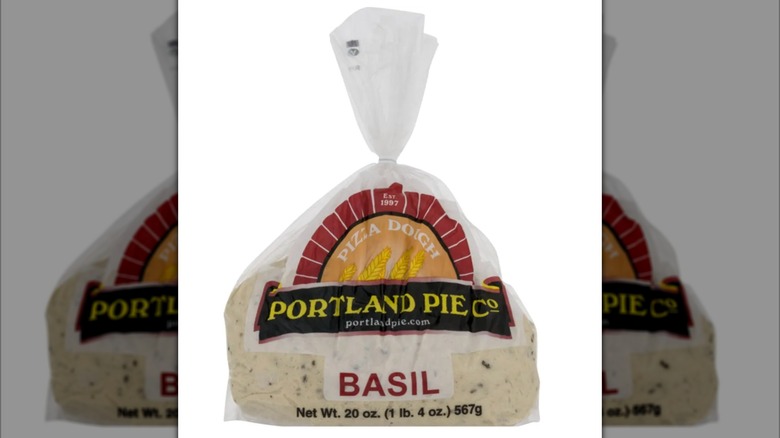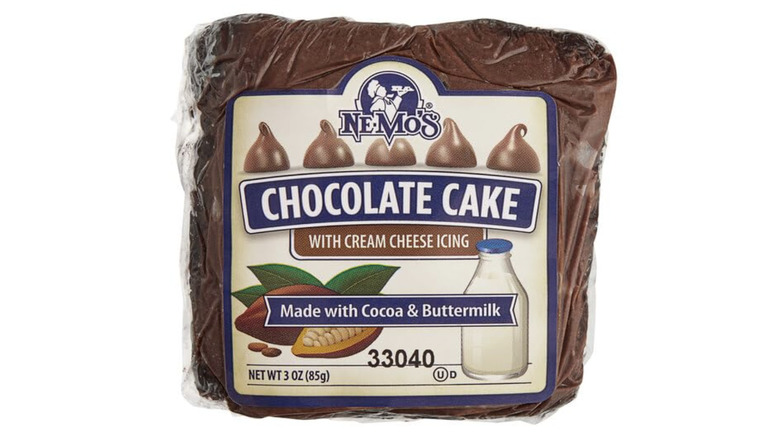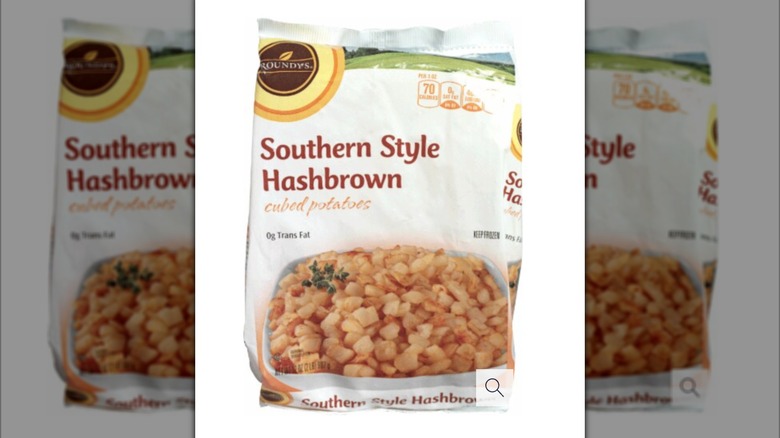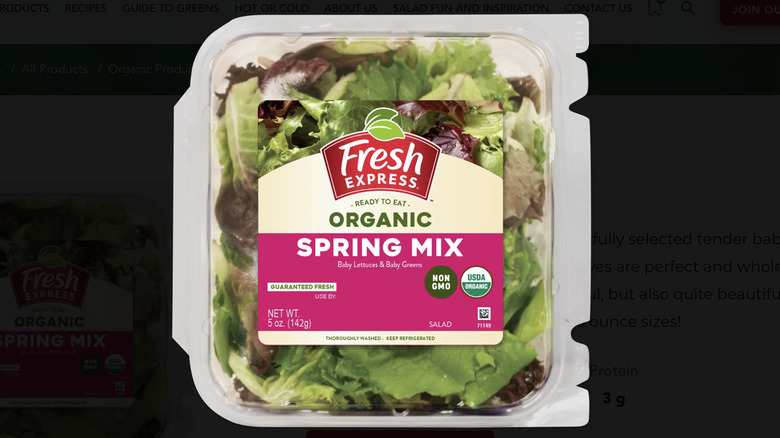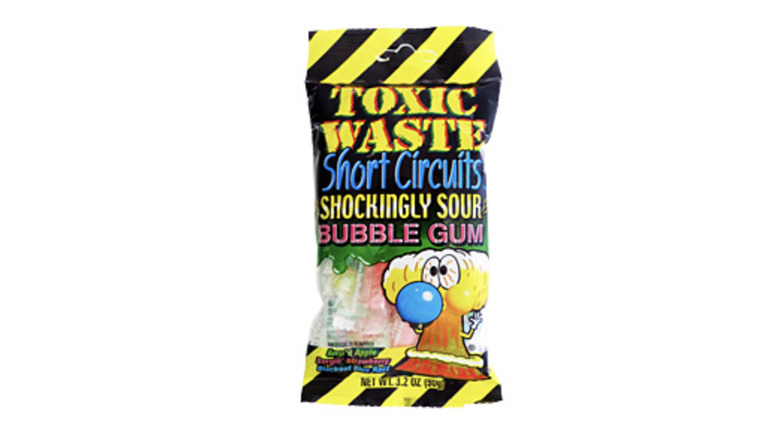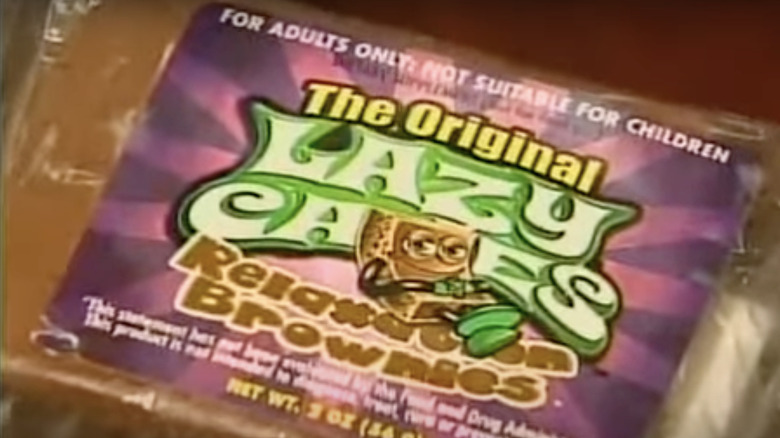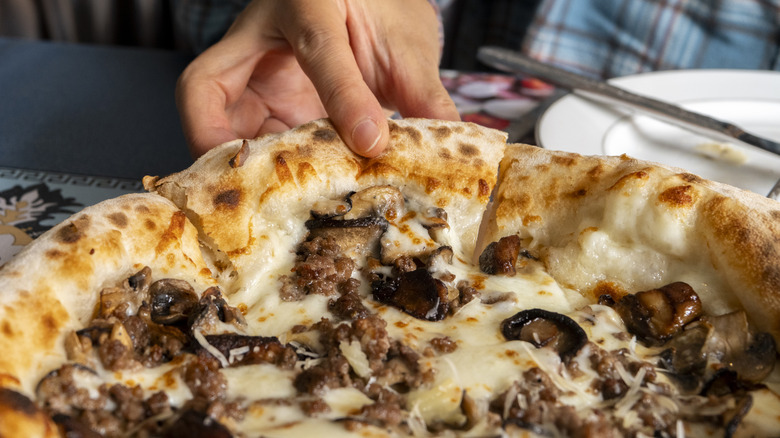The Strangest Food Recalls In US History
We may receive a commission on purchases made from links.
Food products are recalled for a range of reasons, with mislabeling and bacterial contamination topping the list. Other common causes for product withdrawals include the presence of undeclared allergens and contamination with a foreign object. Considering the scale and complexity of modern food production, lapses are bound to happen. After all, it takes a lot of workers, machines, and suppliers to get a list of ingredients to the dinner table. Just one misstep can ruin a seemingly seamless production process, which can result in a costly recall.
While most food safety alerts follow a similar pattern, sometimes things can take an unexpected turn. Whether it's a wrong ingredient, contamination with an object or substance that definitely shouldn't be in food, or another production mishap, things don't always go according to plan. Suffice it to say that the food industry has seen its fair share of downright bizarre recalls.
Ready to delve into the weird world of the strangest recalls in U.S. history? Here are some of the most unbelievable — and sometimes unsettling — recall cases to hit the headlines.
Prophet Premium Blends recalls Diamond-Shruumz psychoactive candies after hundreds report falling ill (2024)
Many recalls are sparked by undeclared ingredients — most of them known allergens that fail to appear on the product label. The Diamond Shruumz recall of 2024 took the undeclared ingredient mashup to the extreme with psychoactive compounds that left dozens hospitalized, hundreds ill, and three dead. Consumers reported a range of symptoms after eating the products, including nausea, vomiting, abnormal heart rate, seizures, and even loss of consciousness. The affected edibles included Diamond Shruumz Microdosing Chocolate Bars, Infused Cones, and Micro-Dose and Mega-Dose/Extreme Gummies.
As far as candy recalls go, the Diamond Shruumz fiasco was a doozy. Upon investigation, the FDA found that some of the products contained muscimol, a psychoactive substance derived from the amanita muscaria mushrooms. The edibles were also found to contain a host of other suspect ingredients, including psilocin, which is a Schedule I-controlled substance, and pregabalin, which is a prescription-only drug. The compounds detected in the products were present in different amounts and compositions, only adding to the unpredictable nature of their effects on consumers.
Trader Joe's recalls products due to potential contamination with rocks and insects (2023)
The latter half of 2023 was a particularly troubling period for Trader Joe's due to an unusual string of product safety issues. To begin with, in July, the company announced a recall of its Trader Joe's Dark Chocolate Chunk and Almond Cookies and Almond Windmill Cookies, after a notification from a supplier that the product may contain rocks. Underscoring its seriousness, the FDA gave the recall a Class II designation, which pertains to "a situation in which use of, or exposure to, a violative product may cause temporary or medically reversible adverse health consequences or where the probability of serious adverse health consequences is remote."
Several days after the rock debacle, Trader Joe's found itself under the microscope again when it issued a recall of the aptly-named Unexpected Broccoli Cheddar Soup due to the possible presence of insects in the broccoli florets. Once again, a third-party supplier was to blame. Finally, in late July, the chain pulled its Trader Joe's Fully Cooked Falafel Heat & Eat from the shelves in response to reports of possible contamination with rocks. It's unclear whether this recall was connected to the earlier cookie contamination. If you are curious how these strange ingredients ended up in standard grocery items, here's how rocks and bugs get into our food.
Hannaford Supermarket recalls It'll Be Pizza Portland Pie after consumers find razor blades in pizza dough (2020)
Product recalls are not usually the result of foul play. However, this is precisely what happened when Hannaford Supermarket announced a recall of its It'll Be Pizza pizza dough. The issue was discovered at the beginning of October 2020 after customers who purchased the product at the supermarket's Saco, Maine, location discovered razor blades in their Portland Pie pizza dough.
Shockingly, similar cases of product tampering also took place at Hannaford Supermarket in Sanford, Maine, and Dover, New Hampshire. By October 11, Hannaford pulled all of its Portland Pie products from supermarket shelves, including Portland Pie cheese. The scope of the recall was later broadened to also include Shaw's and Star Markets.
It wasn't long before the police zeroed in on the culprit behind the malicious tampering case — Nicholas Mitchell, a former employee of It'll Be Pizza. It became clear after surveillance footage showed Mitchell tampering with multiple dough packages. He was eventually sentenced to four years and nine months behind bars. Luckily, no injuries were ever linked to the razor blades.
Horizon Food Group recalls Ne-Mo's cakes because of bird foot contamination (2019)
Founded more than 40 years ago, Ne-Mo's prides itself on "integrity, tradition, and fine quality ingredients baked into each sweet treat." Unfortunately, Ne-Mo's reputation took a hit in 2019 after a rather unusual incident. When the Horizon Food Group issued a recall of more than 45,000 pounds of Ne-Mo's cakes, it wasn't due to pathogens or undeclared allergens — rather, it was because customers had bitten into bird feet.
The recall involved several flavors of Ne-Mo's individually-wrapped cakes, including Chocolate Cake with Cream Cheese Icing, Red Velvet Cake with Cream Cheese Icing, and Birthday Cake with Buttercream Icing. Despite the unappetizing nature of the incident, the Horizon Food Group never issued any information about how the offending bird foot or feet ended up in its baked goods. All we know is that the tainted cakes were manufactured at a Horizon Food Group facility in San Diego.
US Foods recalls raw beef and pork due to possible contamination with human blood (2019)
Raw meat can be a bloody business, but no one even anticipates it to come from a human source. This is exactly what happened when US Foods pulled its fresh and frozen beef and pork from circulation. The meat was sold under four different brand names: Stock Yard Angus, Cattleman's Selection, Patuxent Farms, and SRA. The reason for the recall — an employee may have cut himself during the production process on July 18, 2019, two days before the recall was issued.
In total, Alabama-based US Foods recalled more than 700 pounds of meat that had been distributed to restaurants in Florida, Alabama, Georgia, Mississippi, and Tennessee. Due to the seriousness of the potential contamination, the FDA gave the recall a Class I designation, described by the agency as "a situation in which there is a reasonable probability that the use of, or exposure to, a violative product will cause serious adverse health consequences or death."
McCain Foods USA recalls McCain Hash Browns due to contamination with golf ball pieces (2017)
There is a fairly straightforward explanation for those curious about how golf ball fragments found their way into McCain's frozen hash browns. The plastic and rubber remnants of the golf balls were accidentally harvested along with the potatoes used to make the hash browns. They were likely chopped up along the spuds before being processed, frozen, and packaged for commercial sale.
The affected products included specific batches of Roundy's Southern Style Hash Browns and Harris Teeter Southern Style Hash Browns sold in North Carolina, South Carolina, Virginia, District of Columbia, Delaware, Florida, Georgia, and Maryland. The recall was later expanded to also include Wegman's O'Brien Hash Browns. While the contaminated hash browns presented a significant choking hazard or risk of injury to consumers, no adverse health effects were linked to the products at the time of the recall.
Fresh Express recalls Organic Marketside Spring Mix after a dead bat is found in packaging (2017)
Founded in the 1920s, Fresh Express initially shipped heads of lettuce on ice by rail — this is where the term "iceberg lettuce" got its beginnings. Later, in 1989, the company pioneered pre-washed, bagged salad — an item that today is a staple on most supermarket shelves. It's precisely this salad mix that got Fresh Express into trouble in 2017 — and for a very unusual reason.
Fresh Express announced a recall of its Organic Marketside Spring Mix after two customers found "extraneous animal matter" in a plastic container containing the salad. More specifically, the foreign matter turned out to be a dead bat. Unfortunately, the duo had already sampled the tainted product, which was sold at Walmart stores in the Southeastern U.S.
Since the bat was in a decayed condition, the Centers for Disease Control and Prevention (CDC) couldn't rule out that it wasn't infected with rabies. This meant the two salad enthusiasts had to take a preventative treatment for the disease. "Both people report being in good health and neither has any signs of rabies," the CDC reported at the time (via NPR).
Candy Dynamics recalls Toxic Waste Short Circuits Shockingly Sour Bubble Gum because it's actually toxic (2011)
Whether it's ultra-sour or painfully spicy, extreme candy has a novelty factor that goes beyond the typical sensory experience. Tapping into this market, Candy Dynamics offers a range of extreme-tasting confections, including Toxic Waste Blue Sour Candy, which is advertised as the sourest candy around.
In a bizarre twist, Candy Dynamics found itself in the spotlight after its Toxic Waste Short Circuits Shockingly Sour Bubble Gum was pulled from the shelves in 2011 — not for its extreme flavor, but for being toxic. The candy, which featured a "shockingly sour core," also offered an extra ingredient — excessive amounts of lead. This heavy metal can be harmful to humans, affecting the nervous system, brain, and kidneys.
Under FDA regulations, candy can contain lead in the amount of 0.1 parts per million. Anything above that makes the product dangerous to health. After testing Candy Dynamics' gum, the FDA found that it contained 0.189 parts per million of lead, almost double the permitted amount. Notably, earlier the same year, Candy Dynamics recalled its Toxic Waste Nuclear Sludge Chew Bars for the same reason — excessive lead levels. Both products were manufactured in Pakistan.
StarLink Corn recalls genetically modified corn that wasn't cleared for human consumption (2000)
GMO products intended for human consumption must undergo a safety evaluation before hitting the market. Unfortunately, this didn't happen in 2000, when StarLink's corn was distributed without the appropriate approval. In the U.S., genetically engineered crops are regulated by the FDA, as well as the U.S. Department of Agriculture (USDA), and the Environmental Protection Agency (EPA). In this particular case, the FDA didn't approve StarLink's corn for human consumption — it was cleared only as animal feed — due to concerns that it might trigger allergic reactions.
Believe it or not, StarLink's GMO corn ended up in approximately 300 products, including taco shells, tortillas, and snack chips after it was mixed with conventional corn. Around half of StarLink's corn may have been affected by the mix-up. The FDA received 51 reports of adverse reactions from consumers who had eaten StarLink corn products, however, it's unclear whether those were actually connected with the grain.
The Western Sugar Cooperative recalls animal feed after human remains are found in processing equipment (2014)
Although the Western Sugar Cooperative's produce wasn't meant for human consumption, it was fed to cattle that was likely to end up as burger patties and juicy steaks. This made it that much more disturbing when the pulp, pellets, and tailings from processed beets had to be recalled after it was discovered that an employee's remains had been accidentally processed along with the animal feed. The horrific incident took place on January 4, 2014, when Anfesa Galaktionoff, who worked at the company's Lovell sugar beet factory in Wyoming, fell into the industrial system designed to clean sugar beets, contaminating the produce.
In total, the Western Sugar Cooperative recalled 3,700 tons of animal feed to prevent it from entering the supply chain. In addition, the U.S. Department of Agriculture purchased all the cattle destined for slaughter that may have eaten the tainted feed. The scale was significant, with at least 5,000 head of cattle potentially exposed to the contaminated produce.
HBB LLC recalls Lazy Cakes Relaxation Brownies due to unauthorized melatonin (2011)
No matter how much a producer may wish to make their product's effect reflect its name, they still have to follow regulations. This certainly doesn't entail sneaking a sleeping aid into brownies. In a real life example, HBB LLC landed in hot water after adding melatonin to its Lazy Cakes Relaxation Brownies. Melatonin, which is normally sold in a tablet form, is a hormone naturally produced by the body that regulates the sleep cycle.
In 2011, the Arkansas Department of Health announced a statewide recall of HBB LLC's Lazy Cakes when a 2-year-old toddler had to be hospitalized after eating the brownies and slipping into a deep sleep. This shouldn't have been surprising since the cakes contained 8 milligrams of melatonin, well above the recommended average adult dose of between 1 to 3 milligrams.
The incident was particularly concerning considering the product's child-friendly labeling — the packaging depicted a cute cartoon mascot named Larry Lazy Cakes. Furthermore, the product was marketed as snack food and described as having "the same ingredients your mother uses to make brownies."
Papa Fabbrini's Frozen Pizzas organizes The Great Michigan Pizza Funeral after United Canning recalls canned mushrooms (1973)
Not many would have imagined that a product recall could lead to a pizza funeral. Yet that is exactly what happened when United Canning pulled 75 million cans of mushrooms from supermarket shelves in 1973 in the first major product recall in U.S. history. The safety alert was issued after an employee at a United Canning facility in Ohio noticed bulging cans, which can be a sign of contamination with botulism.
Unfortunately, Mario Fabbrini of Papa Fabbrini's Frozen Pizzas had already used the potentially tainted mushrooms on his pizzas — between 30,000 and 44,000 of them, depending on the source. Bearing huge losses, Fabbrini came up with a publicity stunt that involved a staged funeral. The Great Michigan Pizza Funeral took place at a Michigan farm, where Fabbrini buried his mushroom-topped pizzas in an 18-foot hole. Hundreds turned up to watch the spectacle, including the Michigan governor at the time, William Milliken, who praised Fabbrini, telling him, "I admire your spunk and your spirit. You are an example for businessmen all over the country who are facing tough problems. You are fighting back and I'm sure you will succeed" (via The South Bend Tribune).
Curious to find out about other canned food safety scares? Check out these canned food recalls that affected millions.
